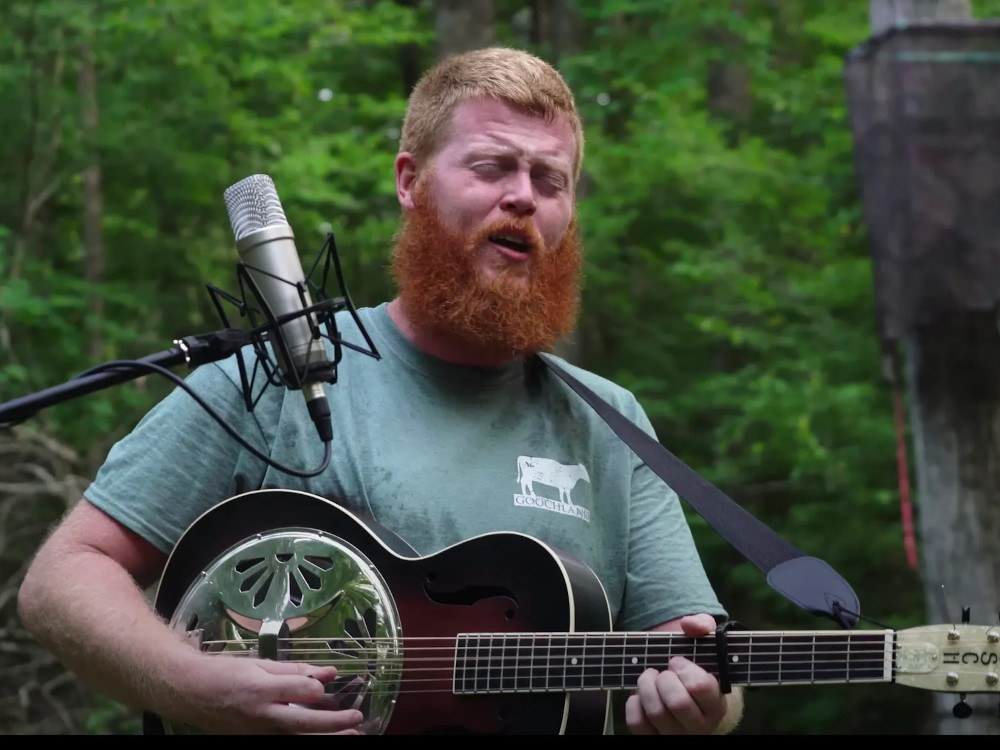Terry Mattingly / Religion Unplugged on an unknown who went to number one in the US. Conservatives, by endorsing this song of working-class lament, has undercored the class dimension of the US culture war.
(OPINION) Oliver Anthony counted about 20 listeners when he performed earlier this summer at a produce market in coastal North Carolina.
That was before Aug. 8, when YouTube channel radio posted his “Rich Men North Of Richmond” video. More than 35 million views later, as of this week, the unknown country singer from Farmville, Virginia, has become a culture-wars lightning rod.
When he returned to the Morris Farm Market, near Currituck, he faced the massive Aug. 13 crowd and read from Psalm 37: “The wicked plot against the righteous and gnash their teeth at them; but the Lord laughs at the wicked, for he knows their day is coming. The wicked draw the sword and bend the bow to bring down the poor and needy, to slay those whose ways are upright. But their swords will pierce their own hearts, and their bows will be broken.”
Anthony then sang his NSFW (not safe for worship) hit about suicide, depression, hunger, drugs, politics, child sex trafficking and dead-end jobs.
“I’ve been sellin’ my soul, workin’ all day / Overtime hours for bullspay / So I can sit out here and waste my life away / Drag back home and drown my troubles away,” he sang, with the crowd shouting along. The chorus began: “Lord, it’s a damn shame what the world’s gotten to / For people like me and people like you / Wish I could just wake up and it not be true / But it is, oh, it is / Livin’ in the new world / With an old soul.”
“Rich Men North Of Richmond” debuted at No. 1 in Billboard’s Top 100, the first time ever for a new artist without a recording contract and mainstream radio support.
“The song was immediately politicized, even though there have always been country songs with singers lamenting the state of their lives and the state of America,” said David Watson, a theologian and country music fan. He is academic dean of United Theological Seminary in Dayton, Ohio, near a Rust Belt poverty zone with historic ties to Appalachia.
“This song is a lament and there’s no way around the class element here. He’s saying that the rich are living it up and I’m forced to grind it out.”
After the viral video, Anthony posted a Facebook note answering some questions about his life. “My legal name is Christopher Anthony Lunsford,” he noted. “My grandfather was Oliver Anthony,” and the stage name is a tribute to his family’s Great Depression roots in Appalachia.
A Virginia high school dropout, he held “multiple plant jobs” in the North Carolina mountains, working “3rd shift, 6 days a week for $14.50 an hour in a living hell. In 2013, I had a bad fall at work and fractured my skull.” He moved to sales jobs for industrial manufacturing, which meant more contact with blue-collar workers. Anthony lives in rural Virginia in a 27-foot camper “with a tarp on the roof” that cost $750 on Craigslist.
In a smartphone video posted days before “Rich Men North Of Richmond,” Anthony said he began writing songs — “Ain’t Got a Dollar,” “Cobwebs and Cocaine,” “I’ve Got to Get Sober” and others — during 2021 struggles.
“I don’t care where you are, what you’ve done, or where you think your life is heading. Everything can change in a moment,” he said.
As for faith, Anthony added: “I spent a long time being an angry little agnostic punk. … I had sort of perverted what my vision of God was, because I looked at the religion of man as God and not God Himself. But there is a Divine Creator who loves you and sometimes it takes falling down on your knees and getting ready to call things quits before it becomes obvious that He’s there. But He’s always there.”
It would appear, said Watson, that this hillbilly songwriter is — to use a popular research term — a “nothing in particular” believer, one without ties to organized religion. This is precisely the kind of American that many church leaders are struggling to understand.
“There’s a strong spiritual yearning in this music and in his story,” said Watson. “While many of our churches today claim that they’re trying to be ‘seeker friendly,’ I’m not sure they’re ready to welcome this kind of seeker.”
Terry Mattingly leads GetReligion.org and lives in Oak Ridge, Tennessee. He is a senior fellow at the Overby Center at the University of Mississippi.

